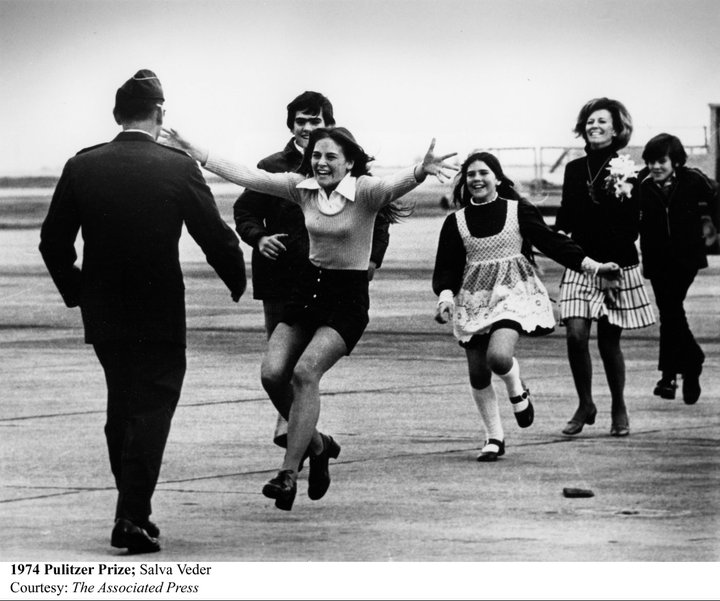It was St. Patrick's Day 1973. Four hundred family members, who hadn't seen their loved ones for years, waited expectantly at Travis Air Force Base in California for the landing of a flight from Vietnam. A group of journalists had been dispatched to cover "Operation Homecoming", the return of 20 POW's, part of an exchange between the North Vietnmanese government and the Americans. One family, the Stirm's, were about to get their father back. And one photographer, Sal Veder, was about to get his Pulitzer prize-winning photograph.
As Lieutenant Colonel Robert Stirm walked down the steps of the airplane and crossed the tarmac, he watched a beautiful scene: his wife and children, whom he hadn't seen in almost six years, were rushing towards him. His teenage daughter, Lorrie, wearing a light blouse and a dark miniskirt, was running so fast she was almost in flight, her siblings not far behind her, her mother bringing up the rear. According to one witness: "You could feel the energy and raw emotion in the air."
It was this scene that hat kept the lieutenant alive for five and a half years in the Hanoi Hilton, a concentration camp in Vietnam where he endured gunshot wounds, torture, illness and starvation; where he had eaten sauteed sewer greens and ground pig remains; where he had lived in solitary confinement, his only means of communication being a tapping system like Morse code (each night their last exchange was "Good night and God bless!"). To keep his mind active, Lieutenant Stirm had recited twice daily the 250 names of his fellow American POWs at the camp. Today, a total of 591 POWs would be coming home.
Photographer Sal Veder took a flurry of shots on the runway, then hurried inside to the washroom to develop them in a makeshift lab; but the men's room was full, so he moved to the ladies' room. Within half an hour, he had six viable photos which he wired to the Associated Press. And within days, the photo, titled "Burst of Joy" was published in newspapers across the United States. Within the year, Sal Veder was awarded a Pulitzer Prize.
Lorrie Stirm and her three siblings were thrilled to have their father back. For so many other children, their father's never came home from Vietnam. But Robert Stirm's wife, Loretta, did not feel quite the same. She had fallen in love with someone else while her husband was in prison. By 1974, the Stirm's were divorced, the oldest two children living with their father, the youngest two, with their mother. While Lieutenant Stirm miraculously survived the Hanoi Hilton, he had a harder time surviving the end of his marriage. All four of his children have a framed copy of "Burst of Joy" hanging in their homes, but Robert wall remains bare. His marriage remains another casualty of the Vietnam War.

wordpress.com
No comments:
Post a Comment